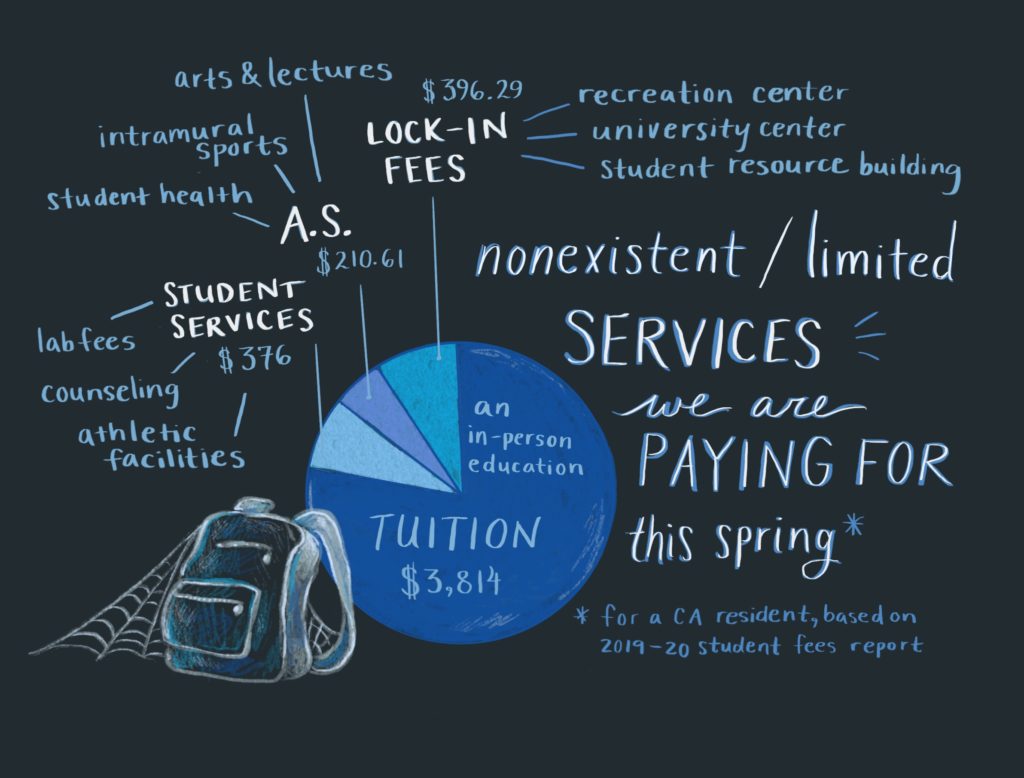Contributing Writer
$6,015.40. That is the cost of my tuition for a campus I can’t even set foot on. $982.90. That is the amount of fees I’m unfairly paying for facilities and programs I can’t use at UC Santa Barbara (UCSB). No online school has this expensive of a price tag.
On March 14, UCSB students received an email from Chancellor Yang announcing remote instruction for the entirety of spring quarter as the result of COVID-19. As students scrambled to adjust to online classes, the announcement left much confusion on the cost of tuition. If students can no longer directly benefit from on-campus services, why are they charged fees to maintain them?
In response to the current situation, UCSB student Yasamin Salari created a petition demanding fee reductions. Alarmingly, students have yet to receive a public statement from the University of California Board of Regents or the chancellor addressing these concerns, even though spring quarter began last week.
The University of California has a responsibility to protect its students, and that includes extending a tuition refund to reflect a greatly reduced quality of education.
Campuses are not fully operational. The library — a vital resource for studying — is now closed. UCSB students cannot make use of resources at the Student Resource Building, University Center, and Recreation Center, nor make in-person appointments. Engaging in events for clubs, sports, and organizations is no longer possible unless done online.
Contracts are signed, loans are taken out, and students work extremely hard specifically to be at UCSB for an in-person experience. Time and money are invested in making connections with professors and obtaining internships and research positions. These experiences are meant to supplement learning and unavailability justifies compensation to students.

At home, these same opportunities for learning are not available. College students are returning to environments that may be disruptive to learning and in more serious cases, abusive. Conversely, choosing to remain in Isla Vista may take the psychological toll on students, who bear the brunt of isolation from loved ones back home.
To rectify this issue, the UCSB Division of Student Affairs announced at the start of April that it would be transitioning services online in order to justify these fees. It’s difficult to understand why UCSB believes services such as concerts, counseling, and recreational activities online hold the same value as an in-person experience. Facilities will also not be in use, decreasing costs for maintenance and cleaning.
Access to the internet and technology is a privilege. Many students rely on the stability of a campus internet connection to complete their work and may not be able to use these resources.
Students also continue to pay rent in Isla Vista, with landlords refusing to cancel rent collection and a scarcity of subletters to replace them. A letter sent out by attorney Robin Unander with the Associated Students Legal Resource Center explains the legal ramifications of cancelling a rental contract, which can only be done under a force majeure clause — the doctrine of impossibility. In most leasing contracts, this clause is nonexistent.
The actions of landlords and the UC especially disregard the needs of low-income students who bear a greater risk of financial insecurity. 40 percent of students enrolled are from low-income families. A majority are claimed as dependents, disqualifying them from the government-issued COVID-19 relief aid.
Meanwhile, UC President Janet Napolitano, earning a yearly salary of $578,916 in 2016, announced job security for UC career employees through June 30. However, many student workers are suddenly left without employment and little compensation.
Non-resident students are cheated in this situation. Imagine paying almost $10,000 more quarterly to be in-state for school while having to tune into a Zoom lecture. Fewer resources are used when conducting labs online. To the universities, students are revenue.
A 2015 California audit revealed the UC increased non-resident enrollment and denied admission to residents to increase tuition revenue to $728 million for the 2014-15 year. It then committed $337 million of state funding to 18 programs that do not directly relate to teaching students, continuing to use state funding for those programs despite awareness that it could find other sources.
The UC Regents are businessmen and CEOs who are so far removed from the student educational experience that they forget the struggle and expense of being a college student in today’s world. An educational institute that invests in the development of nuclear weaponry doesn’t care about being ethical with tuition costs. Student’s voices are the most valid in this situation.
With continuing to keep silent on the possibility of fee reductions, the UC system sends a strong message: it prefers to protect its own business interests over the safety of its students.











